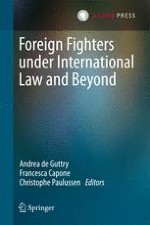2016 | OriginalPaper | Buchkapitel
13. The Obligations under International Law of the Foreign Fighter’s State of Nationality or Habitual Residence, State of Transit and State of Destination
verfasst von : Sandra Krähenmann
Erschienen in: Foreign Fighters under International Law and Beyond
Verlag: T.M.C. Asser Press
Aktivieren Sie unsere intelligente Suche, um passende Fachinhalte oder Patente zu finden.
Wählen Sie Textabschnitte aus um mit Künstlicher Intelligenz passenden Patente zu finden. powered by
Markieren Sie Textabschnitte, um KI-gestützt weitere passende Inhalte zu finden. powered by
